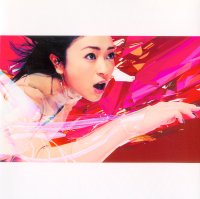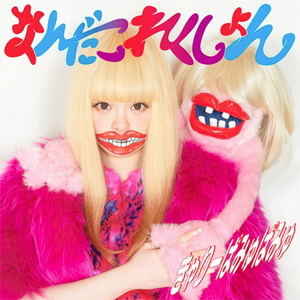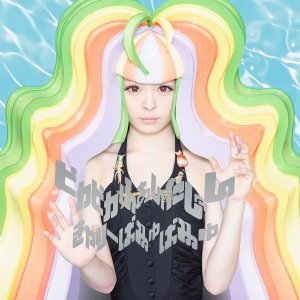
Pony Canyon Inc., also known by the shorthand form Ponycan, is a Japanese mass media publishing company founded on October 1, 1966. The company publishes mainly physical home media on compact discs, including music, films and TV shows and video games. It is affiliated with the Japanese media group Fujisankei Communications Group. Pony Canyon is a major leader in the music industry in Japan, with its artists regularly at the top of the Japanese charts. Pony Canyon is also responsible for releasing taped concerts from its artists as well as many anime and feature film productions.

Geogaddi is the second studio album by Scottish electronic music duo Boards of Canada. It was released on 13 February 2002 in Japan, then five days later in Europe, by Warp. The album is aesthetically and stylistically darker than the approach established on their previous studio album Music Has the Right to Children (1998), and it has subsequently been praised as a standout album in the duo's discography.
Psycho le Cému is a Japanese visual kei rock band formed in 1999. Its members are Aya, Daishi, Lida, Seek, and Yura-sama (Yuraサマ). Psycho le Cému distinguished themselves in the visual kei scene via their cosplay, with their members dressing in colorful, extravagant outfits inspired by anime and video game characters.

The Black Album is the sixteenth studio album by American recording artist Prince. It was re-released with re-mastered audio on November 22, 1994, by Warner Bros. Records after its original release on December 8, 1987, as the follow-up to Sign o' the Times and was to appear in an entirely black sleeve with no title or even a credit to Prince; hence it was referred to as The Black Album. Dubbed The Funk Bible by preceding press releases, and in a hidden message within the album itself, the work seemed to be a reaction to criticism that Prince had become too pop-oriented. It was his attempt to regain his Black audience.

Hits - also commonly known as The Hits Album - is a long-running compilation album series containing contemporary chart music. It originally ran in the United Kingdom and parts of Europe for over twenty years from 1984 until 2006. It was compiled as a joint venture, variously between the compilation arms of the Sony Music, RCA/BMG, and Warner Music groups to rival the Now That's What I Call Music series that had launched a year earlier in 1983, compiled by rival companies EMI and Virgin. Initially, the Hits brand was arguably as popular as its main rival and all of the first eight volumes achieved at least a platinum BPI award, with several of the very early albums going multi-platinum.

Lester Errol Brown MBE was a British-Jamaican singer and songwriter, best known as the frontman of the soul and funk band Hot Chocolate. In 2004, Brown received the Ivor Novello Award for Outstanding Contribution to British Music.

Lunar: Eternal Blue is a role-playing video game developed by Game Arts in association with Studio Alex for the Sega CD as the sequel to Lunar: The Silver Star. The game was originally released in December 1994 in Japan, and later in North America in September 1995 by Working Designs. Eternal Blue expanded the story and gameplay of its predecessor, and made more use of the Sega CD's hardware, including more detailed graphics, longer, more elaborate animated cutscenes, and more extensive use of voice acting. Critics were mostly pleased with the title, giving particular merit to the game's English translation and further expansion of the role-playing game genre in CD format.
Japanese street fashion refers to a number of styles of contemporary modern clothing in Japan. Created from a mix of both local and foreign fashion brands, Japanese street fashions tend to have their own distinctive style, with some considered to be extreme and avant-garde, with similarities to the haute couture styles seen on European catwalks.

"Traveling" is a song recorded by Japanese–American recording artist Hikaru Utada. It was released as the second single from her fourth studio and third Japanese language album, Deep River (2002). The track was written and composed by Utada, whilst production was handled by Utada, her father Teruzane Utada, and long-time collaborator Akira Miyake. Musically, "Traveling" is a dance-pop song, influenced by house music. Lyrically, it discusses human activities and dreams.
Raphael was a Japanese visual kei rock band that formed in 1997, when the members were only 15. They disbanded in 2001, after guitarist Kazuki died at age 19. The remaining members reunited Raphael for two concerts in 2012 and for a 2016 tour.

D is a Japanese visual kei metal/rock band formed in 2003 by Asagi, Ruiza and Sin, after their previous band Syndrome disbanded. D's music includes heavy guitar songs, as well as melancholic ballads and even medieval music and folk dance from around the world. Their lyrics focus on love, human nature and esoteric themes, such as spirituality and the relationship between persons and nature, and their costumes are closely related to the stories they tell. Their styling matches their music: fantastical, gothic and elegant.
BAROQUE was a Japanese rock band originally formed in 2001. Originally signed to S'Cube, a sub-division of the independent record label Free-Will, the band later switched to the company's Firewall Division, with distribution handled by Sony Music Entertainment Japan. After releasing two albums, along with a greatest hits compilation, several singles and home video releases, baroque disbanded in 2004.
Sophia is a Japanese rock band formed in 1994 by vocalist Mitsuru Matsuoka, guitarist Kazutaka Toyota, bassist Yoshio Kuroyanagi, drummer Yoshitomo Akamatsu and keyboardist Keiichi Miyako. Currently signed to Avex Trax since 2011, they made their major debut in 1995 on Toy's Factory. They changed over to Toshiba EMI in 2004, and Universal Music Japan in 2009.
La'cryma Christi was a Japanese visual kei rock band originally active from 1991 to 2007. At their peak, they were considered one of "the big four of visual kei" alongside Fanatic Crisis, Malice Mizer and Shazna. They reunited for a concert in 2009 at the V-Rock Festival, for their short reunion tour in 2010, and for a 15th anniversary tour in 2012.

Ef: A Fairy Tale of the Two is a Japanese two-part adult visual novel series by Minori for Windows PCs. The first game in the series, Ef: The First Tale, was released on December 22, 2006, and the second game, Ef: The Latter Tale, was released on May 30, 2008. The opening video for the game was animated by Makoto Shinkai, and a majority of the music was produced by Tenmon, who has worked in the past with Shinkai and Minori. Female character design was by Naru Nanao of Da Capo fame, while male character design was by 2C Galore.

Nanda Collection is the second full-length studio album by Japanese recording artist Kyary Pamyu Pamyu, release on June 26, 2013, by Warner Music Japan. The album debuted at number one in the Oricon Weekly Albums Chart, becoming the first chart topper release of Kyary's career as well as the first Yasutaka Nakata-produced album to do so since Perfume's JPN in 2011.

Pika Pika Fantajin is the third studio album by Japanese singer Kyary Pamyu Pamyu, officially released on July 9, 2014. The album's official title is a portmanteau of the words "fantasy" and "person" (jin), as officially referenced to the album covers. The songs "Slowmo", from single "Yume no Hajima Ring Ring", and "Scanty Skimpy", from single "Family Party", were not included in the final track listing. Rhino Entertainment/Warner released the Vinyl LP Picture Disc version on January 13, 2015 in the USA. "Kira Kira Killer" and "Koi Koi Koi" were used in the soundtrack for the 2016 motion picture Sing.

Turpsycore is a 2015 album by Scottish musician Momus. It was released on 3 March 2015 by independent record label American Patchwork on CD and distributed by Darla Records.
This article lists the albums and singles attributed to the anime series Heat Guy J.